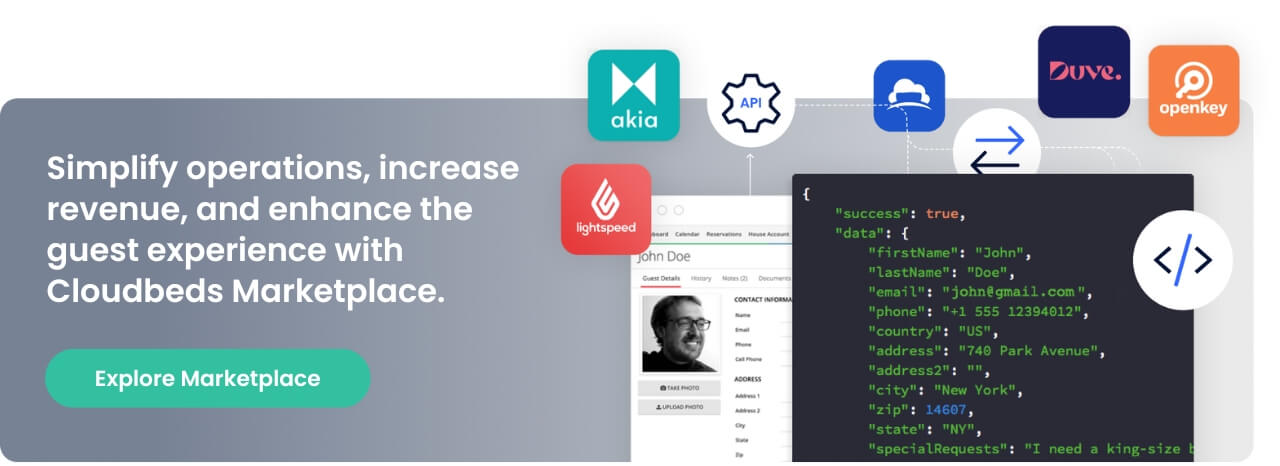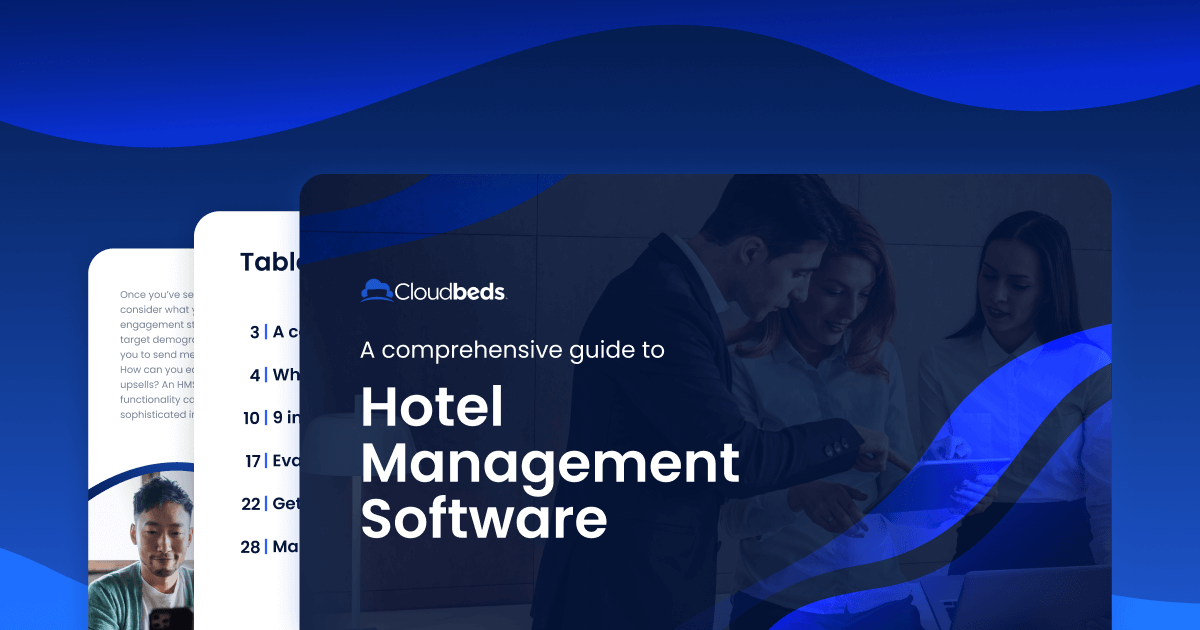
By Cloudbeds
If you’ve been in the hotel industry for a while, you probably never expected to see a day when hotel guests checked themselves in, tidied their own rooms, and received answers to questions from automated chatbots. And yet here we are today.
The self-service trend in hotel technology gained momentum during the pandemic, fueled by the need for hotels to limit contact between guests and employees and to find ways to run efficiently with minimal staffing. Today, self-service is an integral part of the guest experience at an increasing number of hotels, inns, hostels, and vacation rentals.
While some hoteliers may hesitate at the thought of guests serving themselves, many travelers prefer it that way. In a recent Skift survey of over 5,000 consumers, 73% of respondents said they would be more likely to stay at a hotel that offers self-service technology that minimizes contact with staff and other guests.
The rise of self-service solutions within the hospitality industry has prompted lodging operators and hotel managers to rethink their approach to guest service. When is it appropriate to automate services, and when should services be provided by an employee? Here we explore the pros and cons of hotel self-service and share leading solutions and strategies for balancing technology with human hospitality.
What is self-service in hotels?
Self-service in hotels is when guests perform tasks that are traditionally performed by hotel employees. This may include making a reservation using the hotel’s website booking engine, checking in online, or using a mobile app to order a meal – along with a growing list of additional tasks and transactions.
While self-service also includes manual tasks like guests carrying their own luggage and making their own beds, the real innovations today are being driven by technology. Aided by automated systems and mobile solutions, more hotel guests are being given the option to serve themselves at key touch points along the traveler’s journey.
Why is self-service important to hotels?
While traditional hoteliers might dismiss self-service as “not for our guests” or “not luxury”, they do so at their own peril. That’s because self-service is everywhere today – in banking, retail, telecommunications, air travel, restaurants – you name it. It’s also increasingly common in accommodation experiences. For example, guests of Airbnb can manage their entire stay through the Airbnb app without ever seeing the host.
While there will always be guests who prefer to have everything handled by employees, a growing proportion of travelers want the flexibility to help themselves. This is especially true of younger generations who are highly proficient with technology and find traditional service channels like phone calls, face-to-face, and email to be too time-consuming and inefficient.
Businesses are taking note. Mulesoft’s 2022 Connectivity Benchmark Report found that 72% of organizations’ customer interactions are now digital, and for hotels, the contactless guest experience is fast becoming a reality. Properties need to get on board with self-service functionality or risk being left behind. Those who do adopt self-service are set to increase revenue and profitability while also improving customer satisfaction.
6 advantages of self-service technology
Here are just a few of the benefits of self-serve technology:
1. Speed & efficiency.
Technology can process information far more quickly and accurately than humans can, and faster service means less waiting time, fewer errors, and less hassle for guests – not to mention a faster hotel check-in process.
2. Cost savings.
Rather than pay employees to perform simple, repetitive tasks, automation software that’s available in modern property management systems can make it easy for guests to help themselves, saving on labor costs, increasing retention, and easing the pressures of labor shortages.
3. Convenience.
Self-service gives hotel guests more control over their stay, allowing them the flexibility to perform tasks for themselves rather than wait in line or on hold. The key here is to give guests options; you may be surprised how many guests prefer to serve themselves.
4. Better communication.
Handling messages through an integrated platform makes it easier for staff to respond to multiple inquiries at once, compared to spending time in person or on a call with individual guests. Additionally, pre-programmed responses can ensure consistency in messaging and can be automatically translated into the guest’s preferred language in real time.
5. Better service.
By automating tedious tasks, self-serve software frees up employees to provide more meaningful and personalized service experiences.
6. More revenue.
Automated messages, like an upsell offer to upgrade rooms, pre-order additional services during online check-in, or order room service in-stay, can generate highly profitable incremental revenue.
6 disadvantages of self-service technology
Self-serve automation doesn’t come without its challenges. Here are a few things to consider when planning your property’s self-service strategy:
1. Adoption by guests.
Not every traveler is comfortable with technology or wants to do things themselves. Sometimes a little handholding is required.
2. Frustration.
If systems are confusing or connectivity is unreliable, it can frustrate guests and lead to complaints. It’s critical to thoroughly test systems before launching.
3. Limitations.
As smart as computers can be, they can’t replace the warmth, intuition, and creative problem-solving of human employees.
4. Resistance from employees.
Some employees may fear being replaced with automated systems or receiving fewer work hours. It’s important to communicate how technology will augment the work of team members rather than replace them.
5. Costs.
Self-serve systems require investments in technology, such as a modern hotel PMS and guest communication platform. Be sure to perform a cost-benefit analysis and always plan for the long term.
6. Integration.
If technology doesn’t integrate with your PMS and other systems, it can lead to fragmented data and miscommunication. Be diligent about vetting and choosing the right software solutions and vendors for your property (we recommend an integrated hospitality platform).
Where to start with hotel self-service technology
Given the pros and cons, it’s important to think hard about which options will maximize the benefits and minimize the pitfalls for your property. Start with the technology that is well tried and tested by hotels and will bring the highest returns on investment – not only in cost savings but also in guest satisfaction.
Here are some key areas to prioritize:
- Self-service-check-in. Reduce long queues at the front desk and streamline the check-in experience by giving guests the option to complete mobile check-in online prior to arrival.
- Guest communications. Use a guest engagement solution to invite guests to contact you on the messaging channel and in the language of their choice across multiple touchpoints on the traveler journey, whether it’s live chat, text messaging, WhatsApp, Messenger, or other channels.
- Staff communications. Use front desk software to streamline internal processes in the front office, housekeeping, maintenance, and across departments. Built-in automated alerts will help ensure no guest request gets missed.
- Upsell opportunities. Increase revenue and improve the guest experience by providing guests with personalized services and amenities via a digital marketplace and targeted offers.
- Collect feedback and reviews. Actively track guest feedback to service recovery opportunities while the guest is still at your property and automatically collect reviews post-stay to boost your online profiles.

Types of hotel self-service check-in systems
Self-check-in is one of the most popular self-service options offered by hotels today. Here are answers to common questions about this technology.
What is online check-in?
Online check-in allows guests to register online or by mobile device in advance of arrival. Upon arriving at the property, guests check in simply by stopping by the reception desk to pick up their keys or go straight to their room, entering with a mobile key card.
What is a self-service kiosk?
A self-service kiosk is a terminal in the hotel lobby that allows guests to check themselves in and out using a touchscreen. Keys are dispensed by the hotel kiosk or by the front desk staff after check-in. Some kiosks also offer concierge services and the ability to make reservations for dining, spa, and activities.
What is keyless check-in?
Keyless check-in allows guests who check in online to bypass the front desk upon arrival and go directly to their room, opening the door with their mobile device or by entering a code. Some keyless systems feature smart locks that allow doors to be locked and unlocked remotely by hotel staff.
Top 9 self-check-in kiosks and keyless entry providers
Here are some of the best self-check-in technology providers, all of which offer integrations with Cloudbeds’s award-winning hospitality platform. You can find out more by visiting our Marketplace of integrations.
FLEXIPASS Keyless Mobile Access
FLEXIPASS provides keyless access by enabling guests’ smartphones to be used as the room key. Property owners can reduce touchpoints and offer an easy-to-use contactless service for their guests.
Goki
Goki will help you put your property on autopilot. It’s a complete contactless check-in solution that enables you to move a guest from booking to opening their room door with no staff overheads.
KAS Lock Software
Seamlessly integrate guest door access with your bookings using KAS Lock Software. Your guest reservations will be shared with KAS Lock Software so that your reception staff can issue an RFID card or mobile key when the guest arrives.
Lynx
Lynx is a home automation solution for short-term rentals, hotels, vacation rentals, hostels, and apart-hotels. It provides time-sensitive keyless entry, energy management, and asset protection.
OpenKey
Allow guests to check in/out of their room and unlock their door with the OpenKey app. Their dedicated team provides a seamless transition to keyless entry, remote check-in, hotel-specific apps, and more.
Operto
Operto provides control of smart devices for hotels and short-term rentals, including keyless entry without the need of a phone app, noise and occupancy monitoring, smart energy controls, and more.
Roommatik
Roommatik offers a wide range of self-check-in kiosks that fully integrate with your existing software and locks, including magstripe or contactless cards, code or Bluetooth enabled, and physical keys.
Chekin
Chekin helps hosts automate the entire check-in process from the booking confirmation till the check-out. Allowing to save time, money and comply with the legal requirements by managing everything online: guests registration and identification, data sending to authorities, rental agreements and digital signature, damage protection, upselling, tourist taxes, online payments, remote access and much more.
True Omni
True Omni is a cloud-based interactive omnichannel app platform that connects mobile, interactive kiosk, and digital signage to provide contactless, engaging, and revenue-extending guest solutions.
The future of self-service automation in hotels
While personalized, human service will always be an essential part of the hotel experience for guests, self-service is just beginning in hotels. As more solutions become available and more travelers discover the ease and speed of self-service, they will expect more options throughout the traveler’s journey. Now is the time to explore how your property can grow and thrive in the self-serve economy to improve the guest experience and drive more revenue through add-ons and room upgrades.









